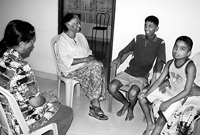|
|
||||
| It’s not the end of the world The Mithuruwela cancer support network offers emotional strength and information to cancer patients and their care-givers
How do you survive an ordeal like cancer? Because cancer is more than just a disease, it is an experience that will change the way you live, the way you think and often, your perception of pain. For many, the word ‘cancer’ spells ‘death’. Yet, those who have endured the trauma – and survived – will tell you that this is not always so. New advances in medicine mean that there is greater hope than ever for a cure. Most importantly, early detection and treatment means there are more chances for a quicker recovery. Mithuruwela is a cancer support network for patients and their care-givers, based in Shanthi Nivasa, a transit home for patients close to the National Cancer Institute at Maharagama. Here, they are dedicated to empowering people with information about cancer, as well as counselling those who have been touched by the disease. A network of volunteers that includes cancer survivors helps patients to look beyond their diagnosis, understand their treatment options and deal with the emotional and physical challenges that cancer poses.
Mala Thalaysingham, one of the founder members of the organisation, is herself a breast-cancer survivor, who has undergone no less than three surgeries. Having had a strong support system of family and friends, who saw her through the long months of treatment, she realised the need for patients to have some form of counselling. She also saw the lack of easily accessible information about cancer, especially for the destitute. When a mutual friend put her in touch with Professor Ryhana Raheem, also a cancer survivor, they decided to form an organization, which met these needs. Launched in 2005, today Mithuruwela has become the voice of courage for many patients as well as their caregivers. 23-year-old Shamali* and her 25-year-old husband, Sunil* were struggling to come to terms with his disease – cancer in the lungs. Having started with a relentless cough over three years ago, their difficult passage of many doctors, hospitals and tests ended in admission at the Maharagama Hospital. Travelling every day from Kandy, leaving their five-year-old son in her mother’s care, Shamali would visit Sunil at the hospital. Sunil, a three-wheel driver, had been the breadwinner of the family and money was tight now. Far away from any loved ones and uncertain of the future, they would cry together in fear and despair. When volunteers at Mithuruwela took her under their wing, she found both the strength and comfort she needed to go on. “They have given us so much courage,” she says gratefully, “People who have had cancer speak to us, and show how they have normal lives now. They come and speak to my husband and give him strength.” She adds that they also emphasise the necessity to take treatment continuously, as Sunil had stopped the medication for some time. Sometimes care-givers need more emotional support than the patients themselves, say those at Mithuruwela. Often they too give up their normal routines to look after a loved one, which is not easy. Kaushi, who has given up her higher studies to be close to her mother at the Maharagama Hospital is thankful for the moral support she gets from the counselling sessions at Mithuruwela. “They come to see my mother, check on her treatment, and encourage both of us,” she says. “We want to give these people a message of optimism, show them how to get on with life,” says Professor Raheem, as she recalls her own positive experience when she underwent treatment in the USA, where there was so much support even from the hospital staff. She too had strongly felt the need to bring such support to the destitute throngs of people at the local hospitals. Doctors don’t always have the time to talk to each patient about their fears and needs, she says, so it is important that others take over this essential role. “Volunteering at Mithuruwela takes dedication and commitment. Patients expect you to be there for them, and you can’t let them down,” says Mrs. Thalaysingham, adding that there is a need for more people to join their network, especially those who can speak Sinhala and Tamil. Volunteers are trained by Sri Lanka Sumithrayo, and meetings are held once a month as part of their ongoing education. The organisation also has an advisory panel of doctors. As part of their goal to dispel the stigma related to cancer and make information easily available, Mithuruwela prints several booklets on various topics related to cancer in all three languages. Their funds come mainly from volunteers and well-wishers. At present they operate thrice a week on Tuesday, Thursday and Saturday, but hope to go full time as their network grows. They also hope to establish a hotline to provide information and support island-wide. Those who would like to join Mithuruwela and support its cause can write to Mithuruwela, C/o No. 70/1, Peterson Lane, Colombo 6 or email mithuruwela@gmail.com.
|
||||
Copyright © 2006 Wijeya Newspapers
Ltd. All rights reserved. |
